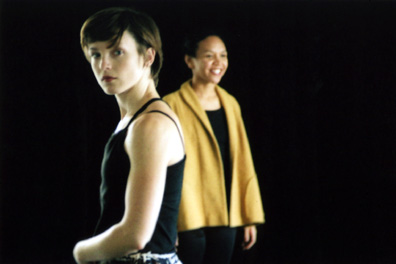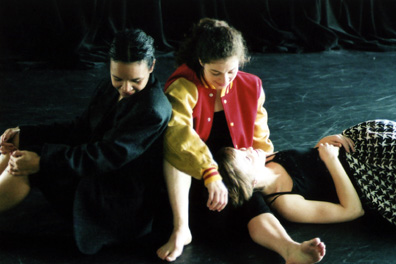Matters
of the Mind,
with the Body Playing Catch Up
"Cellophane"
Dance Performance Group
Jack Guidone Theatre
Washington, D.C.
November 13 2004
by Christopher Correa
copyright
© 2004 by Christopher Correa
 Sometimes
a name tells you everything you need to know. Dance Performance Group
presented two new works under the appellation “Cellophane,”
and the title in question teased out a dyad of connotations to absorb.
By applying Saussure’s signifier/signified rubric onto the pieces
by Nancy Havlik and Saskia Hegt, one may have come away with disparate
but applicable messages, one of which was for the better, the other less
so.
Sometimes
a name tells you everything you need to know. Dance Performance Group
presented two new works under the appellation “Cellophane,”
and the title in question teased out a dyad of connotations to absorb.
By applying Saussure’s signifier/signified rubric onto the pieces
by Nancy Havlik and Saskia Hegt, one may have come away with disparate
but applicable messages, one of which was for the better, the other less
so.
Ms. Havlik introduced a pas de trois inspired by the movie “Rebel Without a Cause,” set to music by Rachmaninov. The trio of dancers employed to take on the archetypal roles that made stars of Natalie Wood, Sal Mineo and James Dean were dressed in the requisite letter jackets, and occasionally tucked mussy locks behind their ears, evoking the 1950s high school experience as rendered in cinematic Technicolor. The imagery, when conjoined with the swelling crescendos of the lento movement of the composer’s Third Symphony, hinted at the magic that Jerome Robbins and Leonard Bernstein made possible with “West Side Story.” Ms. Havlik did not find a similar alchemy between staging and score.
Of the three dancers, only Kelly Nicole Bond found an emotional kinship with the material. She gave the minimal choreography a little lift—to the point of levity at times—from the first skips to the repetitive tilts and bends. Ms. Bond, who suggests a life-size water sprite with her pointed features and knotty pageboy, also provided welcome whimsicality to the otherwise sparse, fragmented steps. Bobbing up and down on the ball of their feet, she and her partners were unable to align with the swirling music, which made it difficult to form vicarious bonds with the characterizations or the miasmic narrative.
The second half of “Cellophane,” on the other hand, revealed a gripping and heart-racing portrait of the great poet Elizabeth Bishop, and provided a thrilling interior monologue for the actress who has drawn some of her deepest inspirations from the Bishop’s anthology.
Ms. Hegt is tall and does not have a dancer’s body. It would seem her movement training (such that it is) was developed between Stanislavski courses. But she found animation in the slightest gestures, and made music of the poems with her gravelly accented voice and her spontaneous motional enunciations.
The playful, pensive “Sandpiper” received a comic breeze when Ms. Hegt stalked the stage, extending her neck back and forth and jutting her head around. “Questions of Travel” became a polemic articulated in body language, as did “North Haven,” with the performer leaping vertically and crouching with each impassioned reading. “Pink Dog” resurrected the giddy sensation New York audiences had in 1984 when they witnessed a budding Mandy Patinkin portray a pair of canines during the song “The Day Off,” from “Sunday in the Park with George.” Ms. Hegt panted quickly and trotted around gaily, stopping occasionally to contemplate the world around her. She melted into a second character, the reader (or the writer) who meets the pet and gives human reasoning to the animal’s seemingly carnal, oblivious life.
 Portraying
Bishop the writer provided another opportunity to embody a figure who
exists only on the page. Ms. Hegt adopted a drippy New England patois
and donned professorial glasses that slid to the tip of her nose as she
read prose from One Art, the poetess’s personal letters. The effect
was witty without being snarky, touching without being cloying.
Portraying
Bishop the writer provided another opportunity to embody a figure who
exists only on the page. Ms. Hegt adopted a drippy New England patois
and donned professorial glasses that slid to the tip of her nose as she
read prose from One Art, the poetess’s personal letters. The effect
was witty without being snarky, touching without being cloying.
“Cellophane” had two very distinct readings at the Jack Guidone Theater. One translation signified the flimsy transparency of an unfinished work. The other served as its signifier the clarity and revealing properties of a skin so thin you can almost see the rhapsodic beating of the heart and the labyrinthine workings of the mind.
Photos (both by Shane
Wells)
First: Kelly Bond and Sandra Roachford.
Second: Kelly Bond, Sandra Roachford & Denise Jakobsberg.
Volume
2, No. 43
November 15, 2004
www.danceviewtimes.com
Copyright ©2004 by Christopher Correa
|
|
|